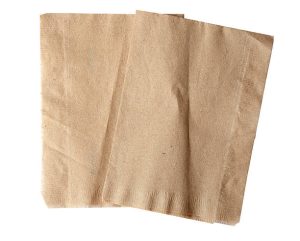An item I regularly interact with is packaging, and more biodegradable packaging should be part of a circular economy. Packaging is something that the average American engages in, for example: online deliveries, in person shopping, soap and water bottles. Something specifically to minimize is the amount of plastics, as it’s overwhelmingly overused and within everything. Also, if it were to become part of a circular economy, it should be more accessible, because some zero waste stores are not in every city/neighborhood, and usually overpriced. Not to mention greenwashing sustainable products should be lessened.
Author Archives: Allyse
Archaeology
Aside from napkins, something I throw out in the trash a good amount of times are receipts. It’s a wasteful habit of mine because although there are email or paper options, I always like to have paper receipts just in case( although nothing happens). Archaeologists might assume that I like to go out occasionally, and explore the areas I’m in. An incorrect assumption is probably that I’m a shopaholic, and can’t live without buying things. I’d say this is incorrect since the things I buy have a variety, usually food, clothes, or gifts.
Conceptualizing Waste
Something I chose to conceptualize waste are magazines, since there are multiple perspectives about it. The disposability is one of the first conceptualizations I think of related to magazines. This is most likely due to the fact that it’s not like a book where you can read and re-experience the story over again, it’s information/news. After you become aware of news, one can say that it’s not something to re-read, so it no longer has a purpose. Secondly, there’s resourceability because they can be repurposed in different unique methods. Just to name a few: jewelry, buttons, paper mache, and other crafty things. I think seeing the potential in items generally deemed disposable requires a different type of consciousness that I find interesting. Thirdly, hoardability comes to mind due to the large quantity of it amongst hoarders. Items in the paper family are easy to accumulate and often more accessible. It becomes tough considering that some hoarders feel guilty of throwing things out, so in their mind they’re combatting wasteful practices. I think the disposable conceptualization makes the most sense as to why they’re considered to be waste. As technology advances, so should access to media news services so there isn’t this bearing amount of magazines in your home.
Pollution
Something I chose was writing in notebooks, during K-12 education, and even higher education. This isn’t much of a regular activity anymore for me, since I use my laptop for everything now, but it’s still relevant. It’s a normalized contribution to the waste that is barely talked about. Multiple notebooks for each subject per kid, then multiplying by the majority of our youth population it becomes a lot. I think it would be very unfair to just prohibit this due to the accessibility of notebooks. An alternative to notebooks would mean something related to technology, which is expensive and requires an alteration to the K-12 education curriculum.
Disposability
Something I regularly interact with that’s typically considered to be disposable are plastic gloves. I’ve had a couple of jobs working in the food industry and it’s something immediately that came to mind. The purposes of these are to protect the health of everyone, so that context matters, and makes it disposable. In terms of construction, it covers your hands fully to protect whatever’s on your hand from the public, and is usually supposed to be replaced every hour or two. This idea also connects to things like switching your cutting board after cutting meats, to later cut vegetables for cross contamination. I feel like also since it’s plastic we sometimes immediately think of disposable, or just things not meant to last or be permanent. The socialization of this also is due to the quality of plastic gloves since they are sometimes easy to break, but they’re not easy to degrade in relation to the environment.

Waste Responsibility
Building off a previous post, I consider clothing waste part of my responsibility in terms of making ethical decisions for its next destination. Clothing waste is heavily normalized in American society, and there’s also a stigma when it comes to second hand clothing. I feel like part of being responsible for your clothes is understanding the corrupt clothing industry filled with child labor and hazardous work environments, which helps you come to terms with your privilege. Additionally, I mainly consider it to be within my control when it’s in my possession, which can be a harmful way of thinking about waste. I think it’s a somewhat appropriate point to mark this division, however going back to the idea of knowing the ins and outs of your waste, can make you of proper consciousness.

Shit
A space that came to mind is the basement in the Dakin residences. The basement is filled with abandoned student spaces(spiritual life center), controls of heating and plumbing, and some trash. On the other side of the laundry area, there’s a room with a dumpster in it, and possibly a chute connecting it to the building above, followed by the expected artwork. Basements aren’t something you’d immediately associate waste with, unless you’re thinking of apartments and incinerators, so it was unique seeing that there. It’s interesting though, why is it there and closed off, where here at Hampshire waste isn’t something that’s being kept away from us. It’s in our bathrooms, common rooms, inside and outside academic buildings, dining commons, we’re even exposed to composted material. I’m curious what the purpose of that placement was for.

Retrieving Trash Prompt
Though I haven’t physically gone into a waste bin/bag/dumpster, I do think glass containers would be something I’d retrieve from these containers. Glass is something that I personally reuse a lot in my family household and not something I automatically tie to waste/trash. For example, previous salsa containers can easily be cleaned and repurposed so many times that it’s not something that has a time limit to its value. Glass containers in particular could be seen as waste, due to this fear of the unknown and “using after someone” that we’ve been socialized to not be as resourceful in our communities. On the other hand, some states recycle glass and people are aware of it being reused for another purpose, but still it should be more encouraged to reuse your own containers, as it also saves time and money in the future.
Hoarding and Cleaning – prompt

Something in my immediate environment that there’s a significant amount of is clothing. Clothes to me are a way to express myself, so having that variety gives me something to look forward to, and it’s just fun. Even though I do wear all my clothes, an argument can be made that it’s a form of hoarding. A few times in the past I’ve held onto certain articles of clothing knowing I wasn’t really going to wear them. For example, being given clothes that I was very optimistic about and didn’t want to get rid of, in case they’d ask about it. Many people hoard clothes and it accumulates so much that it impacts their everyday life, and that is a more concrete example of clothes being hoarded. The ways we get clothes can also be problematic. Normalization of ‘shopping hauls’ and not wanting to be seen with the same thing twice is a societal issue we all engage in. Fast fashion additionally contributes to these unhealthy habits making us believe it is something we need, and unethical environments for factory workers. We should aim to get clothes we know for sure will be worn many times, as well as urge others to shop reused clothing.
Matter out of place – prompt

Something in my everyday life that’s generally considered to be waste are napkins. The average student here at Hampshire uses napkins for breakfast, lunch, dinner, and other snacks in between. Mary Douglas’ conception of dirt being that it’s “a matter out of place ” aligns with napkins being waste. Though it can be transformed to fit aesthetics, its original usage makes it inherently out of place, something only temporary. It’s also very interesting how the value of a napkin could change in an instant; one minute it’s a sense of security to clean up a small mess, the next it’s thrown out and no longer important. Another idea from the text mentions that “saliva pollution can be transmitted through some material substances.” I wonder how these ideas/rules around cleanliness and pollution evolved to more modern day times. Where do reusable napkins/towels of all sorts fall on the clean/dirty scale? What would that conversation sound like? Whilst on the topic of reusable napkins, a new conception of waste can be applied to this idea. One of the google definitions of waste state that “use or expend carelessly, extravagantly, or to no purpose.” It’s intriguing because, after looking at this definition, I take a look around my dorm room and notice how many things have no purpose. Their only purpose is to be of no value.